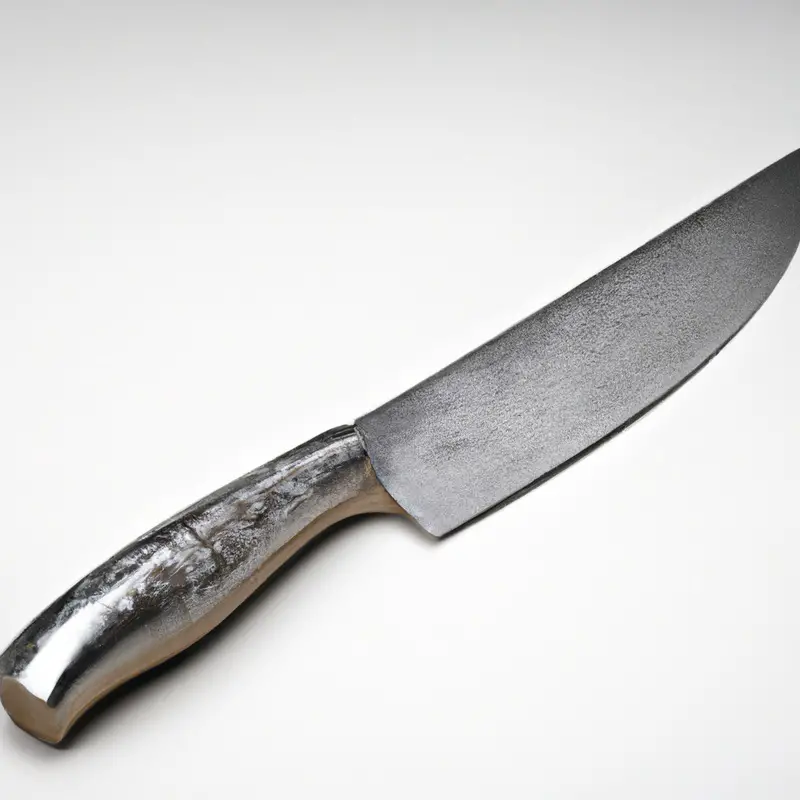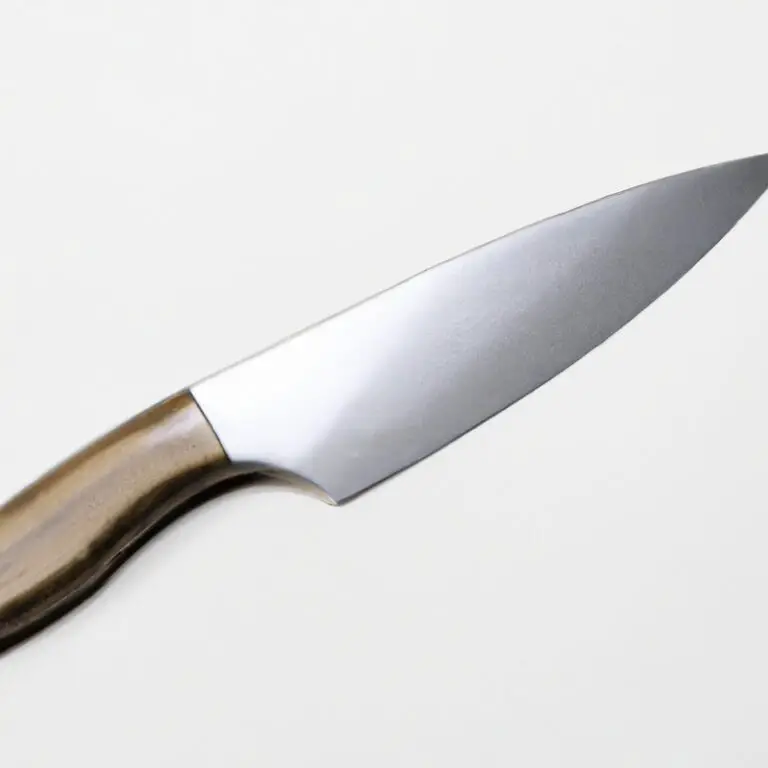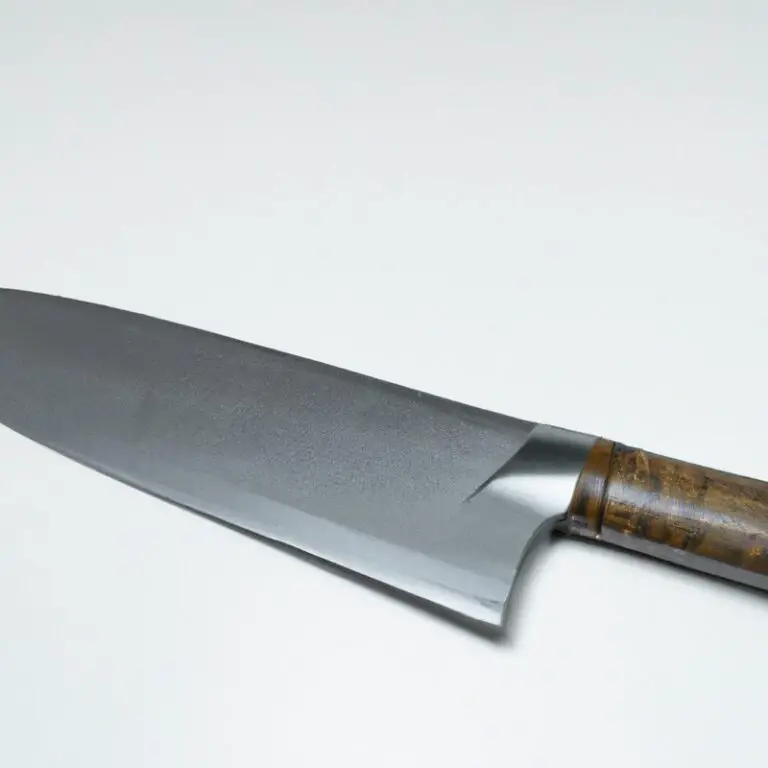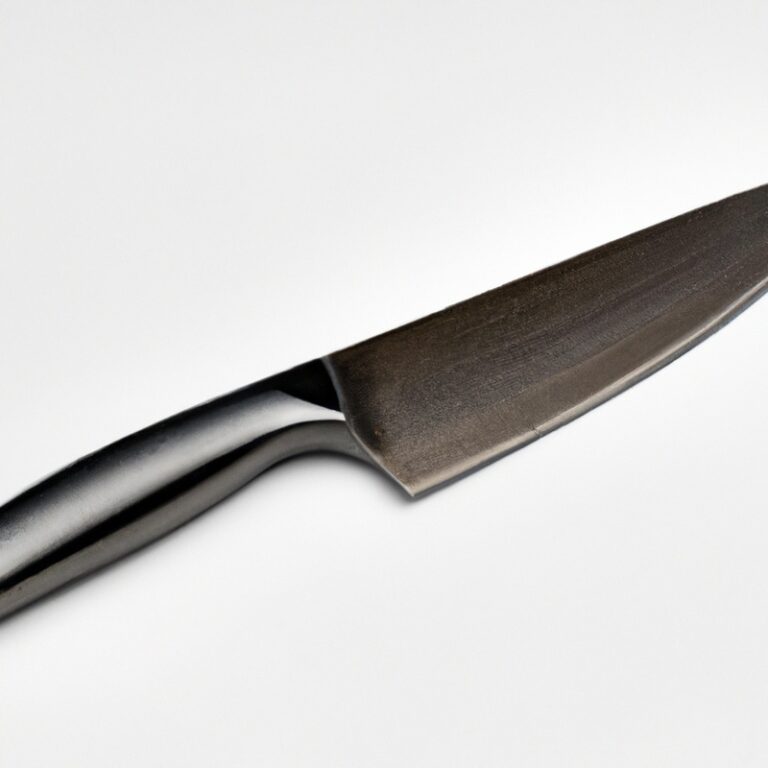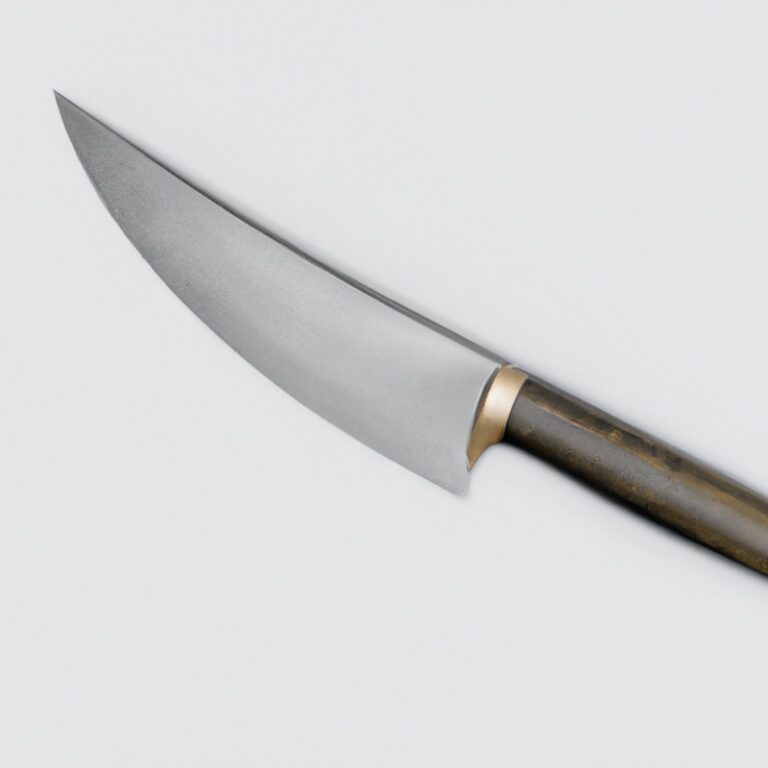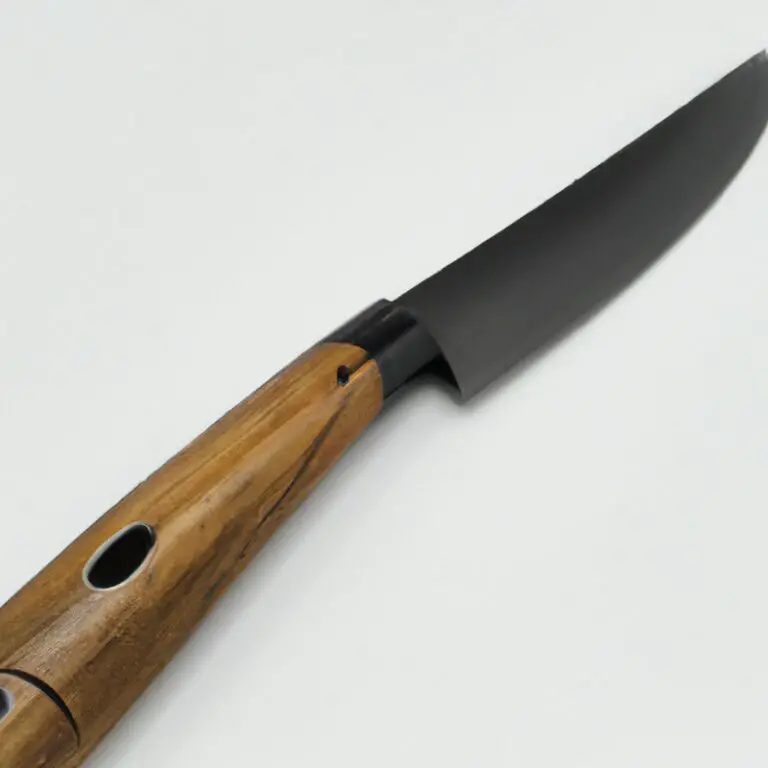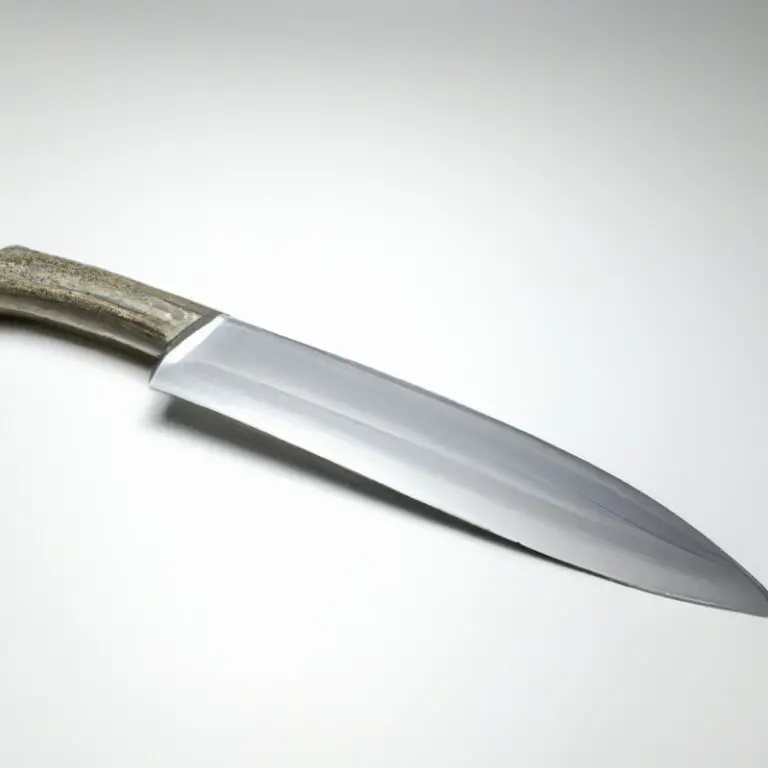How To Prevent Rust On a Gyuto Knife? Tips
Key Takeaways:
- Keep your Gyuto knife dry and store it in a cool, dry place to prevent rust formation.
- Use mineral oil or food-grade oil to protect your knife’s blade from moisture and corrosion.
- Regularly sharpen and hone your Gyuto knife to maintain its sharpness and prevent rusting.
- Avoid using harsh cleaning agents and abrasive materials on your knife, as they can strip away its protective layer and increase the risk of rust formation.
As a chef, your gyro knife is an essential tool that deserves proper care and maintenance. There’s nothing more frustrating than discovering rust formation on your blade, which can affect its durability and functionality.
Fortunately, preventing rust on a Gyuto knife is not rocket science, and with the right measures, you can prolong its lifespan.
In this article, I will share some practical tips on materials selection, cleaning techniques, protective measures, storage environment, and common mistakes to avoid when trying to prevent rust on your Gyuto knife. Read on to learn more.
| Step | Action |
|---|---|
| 1. | Wash the Gyuto knife after use, using mild dish soap and warm water. Avoid using harsh chemicals or abrasive materials as these can damage the knife. |
| 2. | Dry the knife completely with a clean towel and store it in a dry place. Avoid stacking knives together or keeping them in a wet or humid area. |
| 3. | Apply a thin layer of mineral oil or food-grade silicone oil to the blade and handle of the knife. This will help to create a barrier between the knife and moisture, preventing rust. |
| 4. | Regularly inspect the knife for any signs of rust or corrosion. If any are found, use a rust eraser or steel wool to gently remove the rust and then apply oil to the affected area. |
| 5. | Avoid leaving the knife in contact with acidic or salty foods for extended periods of time, as these can cause rust to form. |
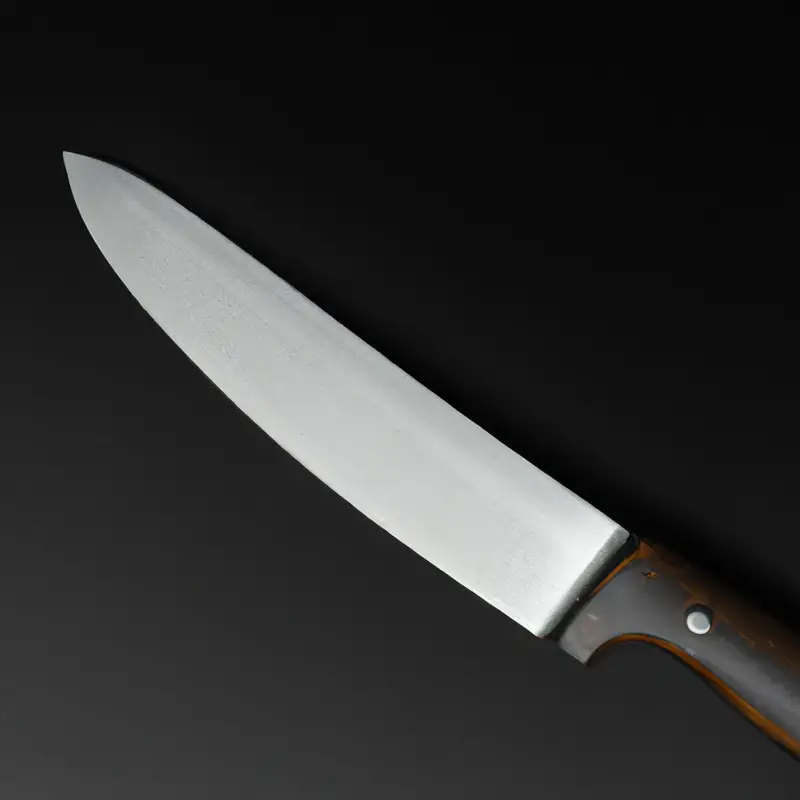
Understanding the Causes of Rust Formation on Gyuto Knives
Rust formation on a Gyuto knife occurs when iron reacts with moisture and oxygen, resulting in the formation of iron oxide. Gyuto knives, made with high carbon steel or cast iron, are more susceptible to rust formation due to their iron content.
Improper maintenance, storage, and use of the knife can also contribute to rust formation.
Using the knife on acidic foods, failing to dry it properly after use, or leaving it in a damp environment can increase the risk of rust formation. Understanding these causes is crucial in preventing rust on your Gyuto knife.
The Importance of Proper Maintenance in Preventing Rust on Gyuto Knives
Proper maintenance is critical in preventing rust on Gyuto knives. Rust not only damages the appearance but also affects the sharpness and durability of the blade.
To avoid rust formation, it is essential to keep your knife clean and dry after each use.
Wipe off any moisture and oil the blade to prevent corrosion. Also, avoid exposing the knife to extreme temperatures and humidity, as this can accelerate rust formation.
Regularly sharpening the blade and using protective coatings, such as blade oil or mineral oil, can help prevent rust and extend the life of your Gyuto knife.
By properly maintaining your knife, you can ensure it stays in top condition and lasts for years of use.
Choosing the Right Materials for Your Gyuto Knives to Avoid Rust Formation
Choosing the right materials for your Gyuto knives is crucial to avoid rust formation. Stainless steel, high-carbon steel, and ceramic are commonly used materials for Gyuto knives.
Stainless steel is the most popular option due to its rust-resistant properties and durability.
It is easy to maintain, and it does not require special treatment to prevent rust formation. High-carbon steel is another popular option for Gyuto knives.
It is harder and sharper than stainless steel, but it requires more maintenance to prevent rust formation.
It is recommended to clean and dry the knife thoroughly after every use. Ceramic knives are also rust-resistant and lightweight, making them a great option for kitchen tasks that require precision and accuracy.
However, they are brittle and susceptible to chipping if mishandled.
In summary, choosing the right material depends on your personal preference, budget, and intended use. Stainless steel is a reliable option, while high-carbon steel is ideal for those who prioritize sharpness and precision.
Ceramic knives are perfect for precise cutting and are great rust-resistant options.
Whatever material you choose, proper maintenance is crucial to avoid rust formation.
Proper Cleaning Techniques to Prevent Rust on Your Gyuto Knife
To prevent rust from forming on your Gyuto knife, proper cleaning techniques are essential. When cleaning your knife, use warm water and mild soap to avoid damaging the blade’s finish.
Avoid using abrasive chemicals or scrubbers like steel wool, which can scratch and damage the surface.
Always dry your knife after washing to prevent water spots, which can cause rust. Additionally, never soak your Gyuto knife in water, which can cause the formation of rust.
Instead, thoroughly dry the blade with a soft and clean towel before storing in a safe and dry place.
You can also apply a light coat of food-grade mineral oil to the blade after cleaning to prevent rust formation. Overall, proper cleaning techniques, including gentle washing, thorough drying, and periodic oiling, are critical to preventing rust from forming on your Gyuto knife.
Applying Protective Measures on Your Gyuto Knife to Prevent Rust Formation
Applying a protective coating on the blade of your Gyuto knife can help prevent rust formation. One option is a food-grade mineral oil.
Apply a small amount to a clean and dry blade, making sure to cover the entire surface.
Alternatively, you can use a rust preventive spray specifically designed for knives. Follow the instructions on the product carefully to ensure proper application.
After applying, wipe off any excess with a clean cloth.
Regularly reapply the protective coating as needed, especially after cleaning the knife. This will help keep your Gyuto knife rust-free and in top condition for longer.
Storing Your Gyuto Knife in the Right Environment to Avoid Rust Formation
Storing your Gyuto knife in a dry and clean environment will help prevent rust formation. Avoid storing the knife in humid areas, as moisture can lead to rust formation.
It is important to store the knife in a sheath or protective cover to prevent it from coming into contact with other metal objects.
Additionally, make sure the knife is completely dry before storing it. If you plan to store the knife for an extended period, you can apply a coating of food-grade mineral oil to protect it from rust.
Remember to check the knife regularly and reapply the oil if necessary.
By following these simple storage tips, you can help prevent rust formation and maintain your Gyuto knife’s sharpness and longevity.
The Role of Temperature and Humidity in Rust Formation on Gyuto Knives
Temperature and humidity play a significant role in rust formation on Gyuto knives. High humidity levels accelerate the oxidization process, which leads to rust formation on the blade’s surface.
Similarly, high temperatures cause moisture to evaporate quickly, leading to the exposure of the blade’s surface to air, which enhances the oxidization process.
Ideally, you should store your Gyuto knife in a dry, cool, and well-ventilated place to prevent rust formation. It is also essential to avoid keeping your knife in areas with constant temperature and humidity fluctuations, such as near windows or in the kitchen sink.
Finally, you can minimize the effects of temperature and humidity by applying a protective coating on the blade’s surface.
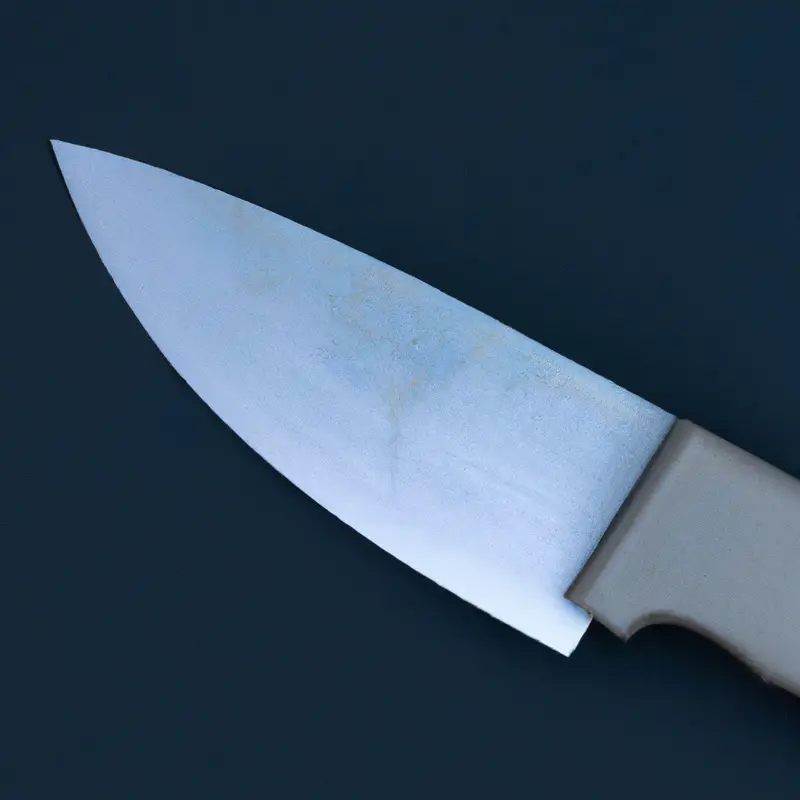
How to Remove Rust from Your Gyuto Knife
To remove rust from your Gyuto knife, there are a few steps you can follow:
- Clean the blade – Use warm water and dish soap to remove any debris or rust on the blade. Use a non-abrasive sponge or cloth to gently scrub the blade.
- Soak the blade – If the rust is still there, soak the blade in white vinegar for a few hours. The acidity in the vinegar will break down the rust. When done, rinse the blade with water and dry it completely.
- Polish the blade – If there are still traces of rust, use a rust eraser or fine sandpaper to gently polish the blade.
- Apply oil – After removing the rust, it’s important to apply oil to the blade to prevent rust from forming again. Use food-grade mineral oil or a specialized blade oil, and wipe away any excess.
By following these steps, you can remove rust from your Gyuto knife and keep it in top condition for years to come.
When to Seek Professional Help to Prevent Rust Formation on Your Gyuto Knife
If you notice that rust has already formed on your Gyuto knife despite your best efforts to prevent it, it is best to seek professional help immediately. Professional knife makers and sharpeners have the expertise and equipment necessary to properly remove rust and prevent it from spreading.
Additionally, they can recommend the best strategies and tools to prevent future rust formation.
It is also advisable to seek professional help if you are unsure of any maintenance or cleaning techniques, or if you experience difficulty in removing rust on your own. Remember, improperly removing rust can damage your knife, causing irreparable harm.
In such cases, it’s better to be safe than sorry and trust the experts.
Overall, seeking professional help is a smart investment that can ensure the longevity and functionality of your prized Gyuto knife.
Common Mistakes to Avoid When Trying to Prevent Rust on Your Gyuto Knife
To prevent rust on your Gyuto knife, it’s important to avoid common mistakes that could make the problem worse. Here are some key mistakes to avoid:
- Leaving your Gyuto knife wet: Leaving your knife wet after washing can lead to rust formation. It’s important to dry it off completely before storing it.
- Not using the right cleaning supplies: Using abrasive cleaners or scrubbers can scratch the blade and make it more susceptible to rust. Stick to mild soap and water and avoid harsh chemicals.
- Storing your knife in a damp environment: Humidity can lead to rust formation, so it’s important to store your knife in a dry place. Avoid leaving it in the sink or on a damp countertop.
- Not oiling your knife: Applying a thin layer of oil to your knife after cleaning can help protect it from rust formation. Use food-grade mineral oil or another oil recommended by the knife manufacturer.
- Neglecting your knife: Regular maintenance is key to preventing rust formation. Keep your knife clean, dry, and oiled, and store it properly when not in use.
Final Verdict
To summarize, preventing rust formation on Gyuto knives is crucial to not only maintain their sharpness but also to ensure extended durability. You can achieve this by choosing the right materials, cleaning techniques, protective measures, and storage environment.
It is also important to understand the role of temperature and humidity in rust formation and to avoid common mistakes that can damage your knife.
If you notice visible rust, it’s essential to address it promptly to prevent further damage. By implementing these prevention and maintenance techniques, you can protect your Gyuto knife and ensure its longevity.
Remember, taking care of your knife is not only a matter of practicality but also a matter of respect for the craft, the tool, and the food it serves.
Practice these methods diligently to protect your investment and ensure that your Gyuto knife remains a reliable and indispensable tool in your kitchen.

